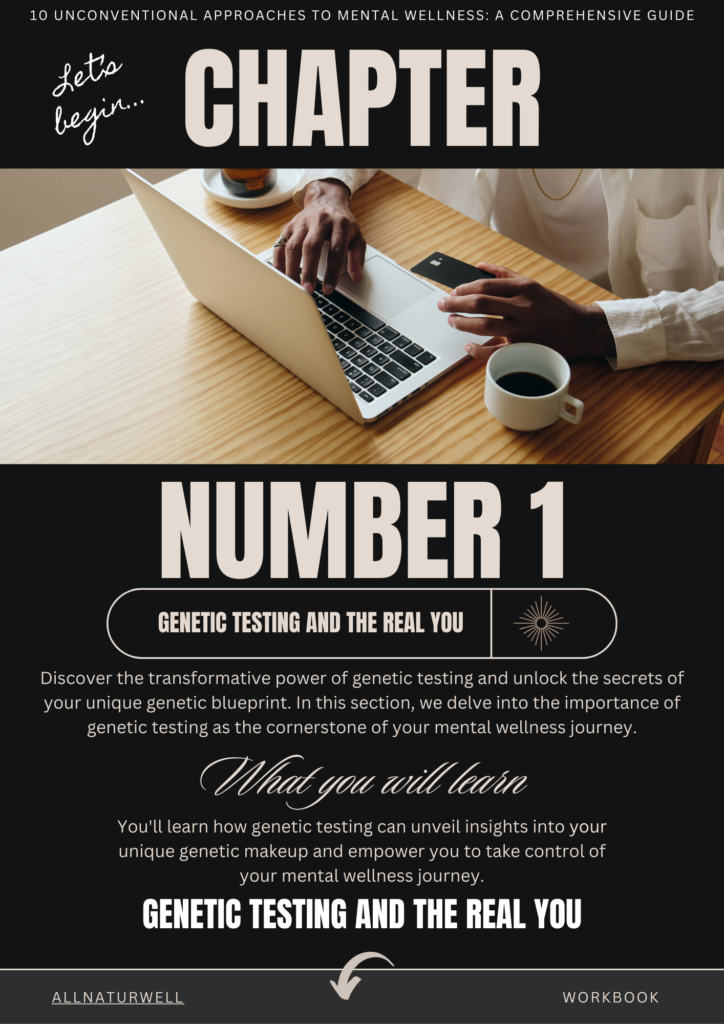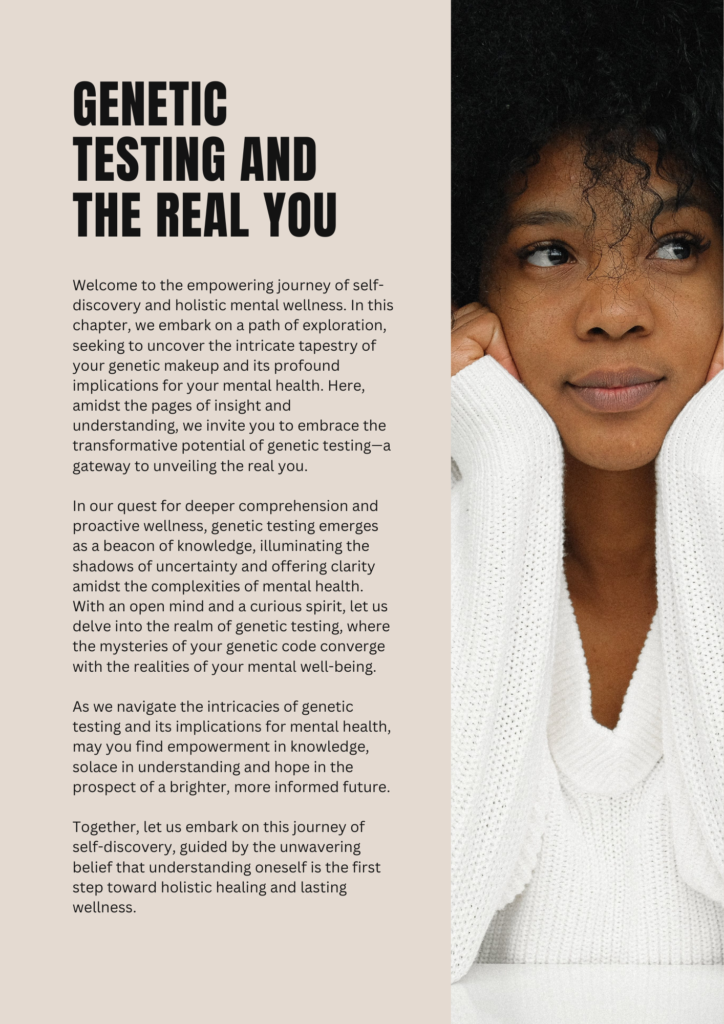Genetic Variations and Nutrition: How Diet Impacts Mental Wellness
When it comes to mental health and overall wellness in general, nutrition plays a key role. But did you know that your genes may be influencing how your body responds to certain nutrients? If you’ve been struggling with mood swings, low energy or difficulty managing stress, the answer just might lie in your own DNA.
Genetic variations, such as those in the COMT gene for example, can have a profound effect on how your body processes certain vitamins, minerals and nutrients. That’s why understanding the connection between genetic variants and nutrition is essential – especially when you’re navigating mental wellness.
In this post, we’ll explore how genetic variations impact your nutrition and how you can tailor your diet to meet your unique needs. By making small, intentional changes, you may find significant improvements in how you feel mentally and physically.
Genetic Variations and Nutrition
Is There Really a Correlation Between Genetics and Nutrition?
Yes, in fact there is. (And well documented, to boot) There’s a very strong correlation between genetics and nutrition.
Your genetic makeup can determine how effectively your body processes different foods, vitamins and minerals and, for some, even certain medicines.
Some people are genetically predisposed to have lower levels of certain nutrients due to enzyme inefficiencies or metabolic differences. For example, those with a genetic variation in the MTRR gene may have difficulty converting vitamin B12 into its active form, which can lead to issues with energy production and cognitive function.
This genetic-nutrition relationship helps explain why some individuals benefit greatly from specific diets or supplements, while others may not experience the same results. Remembr, one size fits all doesn’t work.
So, when an individual understands their own genetic predispositions, the individual can begin to tailor their diet for optimal nutrient absorption and mental clarity.
There are several well-regarded books and studies that explore the relationship between genetic variations and nutrition, especially in the context of mental health. Here are a few of the books and audiobooks to consider:
Books:
The Personalized Diet by Eran Segal and Eran Elinav
This book delves into how personalized nutrition based on individual genetic profiles can influence overall health and wellness, including mental health. It highlights the emerging science of nutritional genomics and how different people respond differently to the same foods. Available on audiobook.Dirty Genes: A Breakthrough Program to Treat the Root Cause of Illness and Optimize Your Health by Dr. Ben Lynch
Dr. Ben Lynch explores the impact of genetic variations (like MTHFR and COMT) on health, including mental well-being. He provides practical advice on how diet and lifestyle modifications can mitigate the negative effects of “dirty” genes. Available in Audiobook.Nutrigenomics and Nutrigenetics in Functional Foods and Personalized Nutrition by Lynnette R. Ferguson
This textbook discusses how genetic factors influence nutrition and health, including the role of gene variants in nutrient metabolism. It’s a great resource for a deep dive into the science behind personalized nutrition. If you only read one, make it this one!The Mind-Gut Connection by Dr. Emeran Mayer
While this book primarily focuses on the gut-brain axis, it emphasizes the role of genetics in determining how we process food and how this can affect mental health and cognitive function. Available in Audiobook.
Genetic Variations and Nutrition
So How Does Genetic Variation Actually Affect Nutrition?
Genetic variations can deeply influence how your body absorbs, utilizes and metabolizes key nutrients. Understanding these variations can empower you to make targeted dietary adjustments that support both your mental and physical health.
By understanding your genetic profile, you can make targeted nutritional choices that support better mental and physical health. Nutritional genomics – often called “nutrigenomics” – allows us to personalize dietary recommendations based on these insights, offering a new approach to achieving wellness.
MTHFR Gene Variant: Folate Metabolism
One of the most well-known genetic mutations affecting nutrition is the MTHFR gene variant. This ‘mutation’ can impair the body’s ability to convert folate (vitamin B9) into its active form, methylfolate, which is crucial for DNA synthesis, neurotransmitter production and detoxification. Folate also plays a key role in mood regulation and brain health.
For Example…
Dietary changes one might consider:
- If you have, or think you might have, the MTHFR varation, you may benefit from taking methylated folate supplements rather than the standard folic acid supplements, as your body might not convert folic acid efficiently.
- You could increase your intake of ‘natural sources of folate’ like leafy greens – spinach and kale, avocados and lentils.
- You could also consider supplementing first with methylated B12 (methylcobalamin), as those with the MTHFR mutation often have trouble processing vitamin B12 as well, which can lead to mood issues and energy deficits.
COMT Gene Variant: Dopamine Metabolism
The COMT gene affects how your brain breaks down dopamine, the neurotransmitter linked to motivation, focus and reward. People with a slower-functioning COMT variant may have higher levels of dopamine, which can lead to anxiety, stress sensitivity and emotional volatility. Conversely, those with a faster-acting COMT variant may have lower dopamine levels, which can manifest as low motivation, fatigue or difficulty feeling satisfied after completing tasks.
Dietary changes one might consider:
- Those with slower COMT activity may benefit from foods and supplements that support dopamine breakdown to balance their mental state. Foods rich in magnesium, like almonds and spinach and green tea – which contains L-theanine – can help reduce anxiety and stabilize mood.
- Those with faster COMT activity may want to focus on foods that support dopamine production. Incorporate tyrosine-rich foods like turkey, eggs and dairy to help maintain healthy dopamine levels and keep motivation and focus high.
APOE Gene Variant: Fat Metabolism and Brain Health
Variations in the APOE gene are associated with how your body metabolizes fats and cholesterol, particularly in relation to brain health. Certain APOE variants (such as APOE4) increase the risk of developing cognitive decline or Alzheimer’s disease later in life, especially if paired with a high-saturated fat diet.
Dietary changes one might consider:
- If you have the APOE4 variant, it’s important to reduce saturated fat intake and opt for healthier fats like omega-3 fatty acids found in fish, flaxseeds and walnuts.
- Emphasize an anti-inflammatory diet rich in antioxidants and fiber from fruits, vegetables and whole grains to support brain health and combat inflammation that could exacerbate genetic risks.
FTO Gene Variant: Impact on Weight and Fat Storage
The FTO gene is often referred to as the “fat gene” because variations here can affect how your body stores fat and regulates appetite. People with certain FTO variants may be more prone to obesity and struggle with weight management due to increased hunger and difficulty feeling full.
Dietary changes one might consider:
- If you have an FTO variant, you may find success with a higher-protein, lower-carbohydrate diet to help regulate appetite and support weight loss. Focus on lean proteins like chicken, fish, legumes and eggs to keep you feeling full longer.
- Foods high in fiber, such as beans, vegetables and whole grains, can also help regulate hunger hormones and reduce overeating.
SLC6A4 Gene Variant: Serotonin Regulation
The SLC6A4 gene regulates the transport of serotonin, a neurotransmitter that significantly affects mood and mental health. Variants in this gene can reduce serotonin availability, contributing to issues like anxiety, depression or difficulty managing stress.
Dietary changes one might consider:
- People with an SLC6A4 variant may benefit from foods that naturally support serotonin production. These include tryptophan-rich foods such as turkey, nuts, seeds and bananas, which the body uses to produce serotonin.
- Supplementing with omega-3 fatty acids and vitamin D can also support serotonin levels and improve mood.
Genetic Variations and Nutrition
Personalizing Your Diet with Nutrigenomics
By understanding your genetic profile, you can make more informed decisions about what you eat to support your mental and physical health. For example:
- If you struggle with anxiety and learn that you have a COMT mutation, something as simple as reducing your caffeine intake, as caffeine can heighten stress and anxiety levels, might make a huge differance.
- If you’re prone to fatigue or low energy, and you discover an MTHFR mutation, increasing your intake of methylated B vitamins could improve your mental clarity and energy levels.
Nutrigenomics is a rapidly growing field, offering powerful insights into how genetic variations can guide us toward dietary changes that boost mental well-being, enhance nutrient absorption, and promote a healthier, more balanced life. By customizing your diet based on your genes, you’re taking a proactive approach to wellness – one that can help alleviate mental struggles and support long-term health.
This approach to genetic testing and nutrition shows that a one-size-fits-all diet isn’t optimal. Personalized nutrition, tailored to your genetic profile, can be the key to better mental health, improved energy, and overall well-being. Explore your genetic insights and consider small dietary changes to discover how much they can impact your health!
Genetic Variations and Nutrition
Can Nutrition Impact My Genetics?
While your genetic makeup doesn’t change, nutrition can influence how your genes are expressed – a concept known as epigenetics. The foods you eat, your environment and even stress levels can turn certain genes “on” or “off,” influencing your overall health. For example, diets rich in antioxidants, omega-3 fatty acids and certain vitamins can support healthy brain function and reduce inflammation, which may help manage symptoms related to mental health disorders.
Epigenetic changes don’t alter the DNA sequence itself, but they can impact how genes function in the body, affecting everything from mood to stress response. This means that even if you have a genetic variant associated with mental health challenges, proper nutrition and lifestyle changes can definately help you manage or even mitigate some of these effects.
Here are a few great books and studies on epigenetics that delve into the science and implications of gene expression influenced by environmental factors:
Books on Epigenetics:
“The Epigenetics Revolution: How Modern Biology is Rewriting Our Understanding of Genetics, Disease, and Inheritance” by Nessa Carey
Nessa Carey explores how epigenetics is changing our understanding of gene expression, inheritance, and disease. This book offers an accessible explanation of the field and its potential to revolutionize medicine and biology.“The Deepest Well: Healing the Long-Term Effects of Childhood Adversity” by Dr. Nadine Burke Harris
This book connects epigenetics with early childhood trauma and adversity. Dr. Harris explains how experiences like stress and trauma can alter gene expression and lead to long-term health effects, emphasizing the importance of early intervention and understanding epigenetic impacts.“Epigenetics: How Environment Shapes Our Genes” by Richard C. Francis
Richard Francis explains the science of epigenetics and how it impacts everything from development to disease. He shows how factors like diet, toxins, and stress can alter gene expression and how these changes may be passed to future generations.
Genetic Variations and Nutrition
How Does Human Genetic Variation Affect Nutritional Requirements?
Genetic variations can make it difficult for some individuals to meet their nutritional needs through diet alone. For instance, people with the MTHFR gene mutation may need a methylated form of folate, which is easier for their bodies to use. Those with variations affecting serotonin or dopamine pathways might benefit from increasing their intake of foods rich in B vitamins, magnesium, or omega-3s, which support neurotransmitter health.
In many cases, understanding these variations helps guide personalized nutrition plans. Whether it’s by choosing the right supplements or adjusting your intake of specific nutrients, these targeted changes can significantly impact mental health and energy levels.
Genetic Variations and Nutrition
Take the Next Step: Tailoring Nutrition to Your Genetic Insights
Now that you understand the powerful link between your genes and nutrition, it’s time to put that knowledge into action. Whether you’ve taken a genetic test or are just starting your research, our site offers a wealth of resources to guide you through this journey. Explore our sections on supplements, recipes and wellness strategies to find practical ways to begin tailoring your diet to your genetic profile.
Making these changes doesn’t have to be overwhelming. Start small by experimenting with different foods, tracking how you feel and paying attention to how your body responds. Over time, these adjustments can lead to significant improvements in both mental clarity and overall well-being.
YOU MAY BE INTERESTED IN:



Disclaimer: The information and/or products mentioned in these article are provided as information resources only and are not to be used or relied on to diagnose, treat, cure or prevent any disease. The statements made in this article have not been evaluated by the Food and Drug Administration. Any products mentioned are not intended to diagnose, treat, cure, or prevent any disease, but rather to be considered as an informational resource only to encourage critical thinking and personal research. The information in this article is intended for educational purposes only. The information is not intended to replace medical advice offered by licensed medical physicians. Please consult your doctor or health care practitioner for any and all medical advice.
Sign up for our weekly newsletter. it's free!

52 Weeks, 52 Topics! Get Our Latest ‘Stay Well’ Newsletter Every Monday And Start Your Week Off AllNaturWell. A New Tip, A New Study Revealed, A New Product Reviewed. Get It Right To Your Inbox Weekly. No Need To Wait. It’s Free!
Studies You May Be Interested In:
Genetic Variation in Nutrient Metabolism and Risk of Disease: A Review of Recent Research – This comprehensive review covers recent research into how genetic variations can affect nutrient metabolism and contribute to the development of mental health disorders. It highlights key gene variants such as MTHFR, COMT, and MTRR that influence how nutrients like folate and B12 are processed. (Reference: Zeisel SH. “Nutritional genomics: defining the dietary requirement by genetic variation and common polymorphisms.” Annu Rev Nutr. 2017.)
The Role of Nutrigenomics in Mental Health – This study explores the connection between nutrition, genetic predispositions and mental health outcomes. It discusses how certain gene variants, like those affecting neurotransmitter metabolism, can be influenced by diet and supplement interventions. (Reference: Kaput J, Noble J. “Genomics and personalized nutrition: implications for mental health.” Mental Health and Well-being 2019.)
Folate, Vitamin B12, and the MTHFR Polymorphism in Mood Disorders – This research highlights the impact of the MTHFR genetic variation on the metabolism of folate and vitamin B12, and how deficiencies in these nutrients are correlated with mood disorders like depression.(Reference: Bottiglieri T, Laundy M, Crellin R, Toone BK, Carney MW, Reynolds EH. “Homocysteine, folate, methylation, and monoamine metabolism in depression.” Journal of Affective Disorders 2000.)




